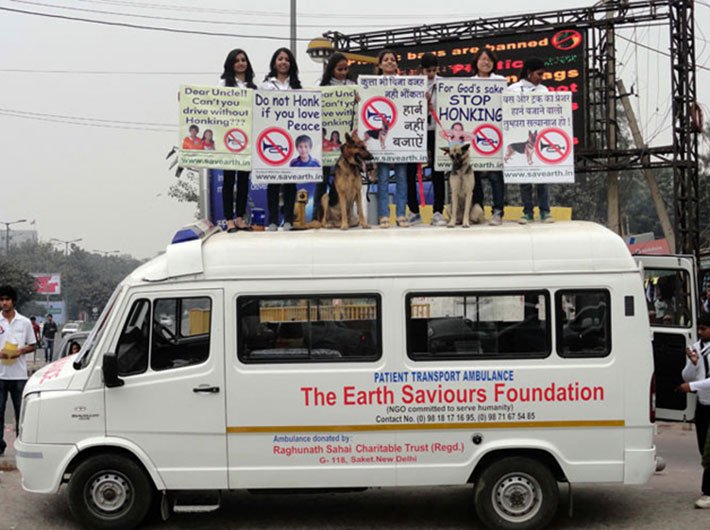The government is considering hefty penalty to curb honking menace and experts have called for a holistic approach to bring down the deafening noise pollution level
The cacophony of noises on roads has finally woken up the government, which is now mulling a fine of Rs.500 for honking needlessly and a much steeper fine of Rs 5,000 for having an ear-shattering air horn. The dealers who install such horns will face a fine of Rs 1 lakh, reports Times of India. But that may not be enough to tackle the frightening noise pollution levels, say experts.
“There are rules regarding honking, but nobody follows those rules,” rues Ravi Bhatia who runs a campaign against honking.
Bhatia, who is the founder of The Earth Saviours Foundation, said that the supreme court has already passed an order against noise pollution. “There is a ban on honking near schools, colleges, hospitals, research centres and even at traffic signals.”
“What we now need is strict enforcement,” he said. He said that penalty amount being considered by the government is “ok”.
“People must be made aware to use horns only during emergency. Motorists need to be trained. Also, pressure horns must be completely banned in the country. The authorities must ensure that the loud pressure horns are not available in the market. Only low-intensity horns should be allowed,” he said.
He called for a systemic change and said that a sustained campaign needs to be run across the country to ensure that noise levels come down.
Dr TK Joshi, director, Centre for Occupational and Environnmental Health at Maulana Azad Medical College, told Governance Now that heavy penalty is a right step, “but the question is of poor enforcement”.
Honking of horns should be banned at night. “We need a holistic approach to tackle noise pollution. We seem to be following a piece-meal approach. It is not pro-active, it is reactive.”
The doctor said that a few years back they had carried out a study which showed that Presbycusis, which is age-related hearing loss, are being reported at the age of 60, while it generally sets in after 75 years.
“Noise pollution has an auditory impact like noise induced hearing loss and people don’t get good quality sleep. Equally important is the non-auditory impact like annoyance and irritation,” he said.
See | Noise level at 40 locations in Delhi
According to dangerousdecibels.org, noise-induced hearing loss can be caused by a one-time exposure to loud sound as well as by repeated exposure to sounds at various loudness levels over an extended period of time. “Damage happens to the microscopic hair cells found inside the cochlea. These cells respond to mechanical sound vibrations by sending an electrical signal to the auditory nerve. Different groups of hair cells are responsible for different frequencies (rate of vibrations). The healthy human ear can hear frequencies ranging from 20Hz to 20,000 Hz.”
It said that sound pressure is measured in decibels (dB). “Like a temperature scale, the decibel scale goes below zero. The average person can hear sounds down to about 0 dB, the level of rustling leaves. Some people with very good hearing can hear sounds down to -15 dB. If a sound reaches 85 dB or stronger, it can cause permanent damage to your hearing. The amount of time you listen to a sound affects how much damage it will cause.”

